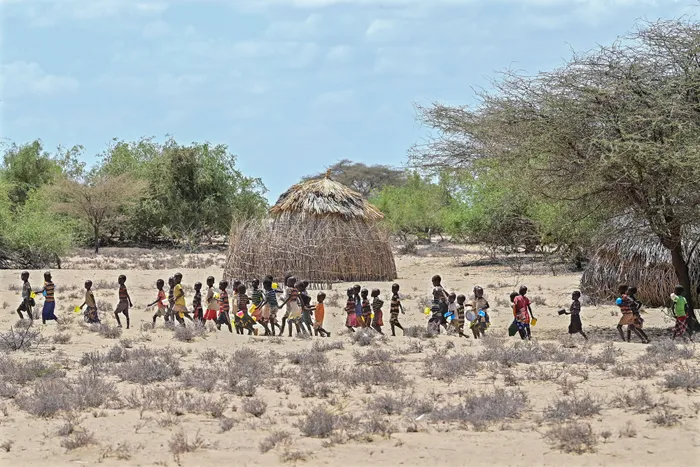African voices must take centre stage on climate change

Picture: Tony Karumba/AFP- Children from the pastoral Turkana community walk on October 18, 2022 in file as they head to receive lunch rations at a nearby food aid distribution point during a drought-intervention community outreach clinic organised by United Nations Internationational Childrens Education Fund (UNICEF) at Nadoto village.
By Kershni Ramreddi and Camrin Moodeliar
“The damage is already being done” is a moral imperative that can no longer be ignored. COP27, also termed the “The African COP”, is an opportunity for Africans to stand up, speak their voice and demand the change that is urgently needed right now. But will this occur for us? Or is this just another conference “party”?
The goal of COP27 ought to be to enhance the implementation of Nationally Determined Contributions (NDCs), which comprise initiatives to lessen carbon emissions, adapt to climate change, and offer financing to support implementation. As COP26 completed the last of the remaining recommendations on implementing the Paris Climate Agreement, it is now time to step up the implementation of our climate initiatives.
The implementation of the Paris Agreement must now prioritise ambitious climate action, in line with 1.5ºC and a stepped-up response to inevitable consequences. COP26: Was it a success? At the Glasgow climate summit, the world made significant strides toward solving the climate catastrophe but stumbled when making the great leap required to keep global warming to 1.5ºC.
When compared to its own goals, COP26 missed the mark. The nations that are mostly responsible for the escalating climate problem did not act. Wealthy nations also fell short of meeting the demands of the most vulnerable nations by failing to adequately fund adaptation efforts or commit resources for the loss and harm these nations are already experiencing. Ugandan climate activist Vanessa Nakate stated: “Finance for adaptation is critical, but for many of us in vulnerable countries, adapting to climate change is no longer enough. You cannot adapt to starvation. You cannot adapt to extinction. You cannot adapt to lost culture and heritage.”
The transformative action that the world so sorely needs was not delivered at COP26. Each nation, notably the biggest emitters, must adopt and implement more aggressive 2030 objectives that are in accordance with their fair share of reductions in order to prevent global warming of more than 1.5ºC.
To assist and build the momentum required to raise targets, we must act quickly to shift from targets to the policies and legislation required to meet the current targets. People on the front lines of our changing world must be supported, and they must participate in decision-making processes.
The losses of the poorest and most vulnerable nations, who have contributed the least to climate change, must also be acknowledged by wealthy nations. Governments are required by law to protect human rights, which includes addressing climate change by slashing greenhouse gas emissions quickly and assisting citizens in coping with its effects. Governments should make a concrete recommendation to swiftly phase out all fossil fuel use and production at the COP this year.
Governments should pledge at COP27 to stop approving any new fossil fuel projects. In order to drastically reduce emissions and mitigate the effects of climate change on human rights, they should also stop all forms of support for oil, gas and coal production, including subsidies and foreign financing.
The rights of communities that are directly impacted by fossil fuel operations, such as those who live near locations for fossil fuel exploration, production, storage, transit, consumption and disposal, should also be protected by governments.
Governments should pledge to safeguard the people who are most vulnerable and secure their involvement and representation in climate change decision-making. This COP, which will take place on the African continent, is an excellent opportunity to talk about the unique requirements and circumstances of Africa as a whole, without bias towards other vulnerable regions or groupings of countries.
Governments should also develop a grievance procedure and specify the guidelines for international carbon trading at this year’s COP in order to protect and enhance the human rights of communities impacted by carbon-offsetting projects.
Additionally, those who are most impacted by the climate catastrophe and least able to adapt should benefit from decisions on climate finance and adaptation. These choices should be made after thorough consultation with all relevant groups, including senior citizens and individuals with disabilities.
More people need to peacefully protest and voice their thoughts in the streets for effective climate action, not fewer. Civil society, particularly child and youth activists, must be fully and meaningfully involved in climate action for it to be effective and protect human rights.
This includes individuals who are directly affected by climate catastrophe and the populations most at danger from its negative effects. The summit this year in Egypt will focus heavily on implementation. The meeting in Glasgow the previous year produced some ambitious new targets.
Now, nations must work hard to determine how they will achieve the targets they have set, including how to pay for climate action. The COP27 is a chance to express solidarity in the face of an existential threat that can only be defeated by co-ordinated action and effective implementation. COP27 is not far away. The race to net zero 2050 has begun.
Ramreddi is from the South Durban Community Environmental Alliance, and Moodeliar is from Zen Environmental Practitioners.
Related Topics: